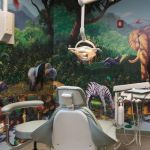Oral Hygiene for Kids: A Complete Guide to Healthy Teeth
- 1. Importance of Oral Hygiene for Kids
- 2. Best Oral Hygiene Practices for Children
- 3. Common Challenges in Teaching Oral Hygiene
- 4. Recommended Dental Products for Kids
- 5. When to Start Regular Dentist Visits
1. Importance of Oral Hygiene for Kids
Oral hygiene for kids is an essential part of their overall health and well-being. The importance of brushing and flossing cannot be overstated, as dental health problems can impact a child's ability to eat, speak, and even socialize. Poor oral hygiene can lead to tooth decay, gum disease, and other long-term health issues that may require expensive treatments.
Starting early with a good oral hygiene routine ensures that kids develop habits that last a lifetime, keeping their teeth and gums healthy well into adulthood. Teaching kids about the importance of oral hygiene from a young age helps prevent future dental issues and promotes confidence in their smiles.
2. Best Oral Hygiene Practices for Children
1. Brush Twice a Day
The foundation of a solid oral hygiene routine is brushing. Kids should brush their teeth at least twice a day, once in the morning and once before bed, using a fluoride toothpaste. Ensure they brush for at least two minutes, reaching all areas of the mouth, including the front, back, and chewing surfaces of their teeth.
2. Floss Regularly
Flossing is often overlooked, but it plays a vital role in removing plaque and food particles from between the teeth where toothbrushes can’t reach. It’s important to start flossing when your child's teeth begin to touch each other, typically around the age of 2 to 3 years.
3. Limit Sugary Foods and Drinks
Diet plays a significant role in dental health. Sugary foods and drinks promote the growth of harmful bacteria in the mouth, leading to cavities. Encourage your child to enjoy water, fruits, and vegetables, and limit their intake of sugary snacks and beverages.
3. Common Challenges in Teaching Oral Hygiene
While teaching oral hygiene is crucial, it’s not always easy. Kids can be reluctant to brush or floss regularly, and making these habits enjoyable can be a challenge. Here are some common obstacles parents face and ways to overcome them:
1. Reluctance to Brush
Many kids resist brushing their teeth because they see it as a chore. To make brushing fun, consider using a toothbrush with their favorite cartoon characters, playing a two-minute song to time their brushing, or rewarding them with a sticker chart for consistent brushing.
2. Fear of the Dentist
Some kids may develop a fear of the dentist, which can make regular dental visits stressful. To alleviate this fear, try taking them to the dentist early, making the experience fun, and using positive reinforcement afterward. Consider visiting a pediatric dentist, who is skilled in handling young patients.
4. Recommended Dental Products for Kids
Choosing the right dental products can make a big difference in your child’s oral hygiene routine. Here are a few recommendations:
1. Kid-Friendly Toothbrushes
Look for toothbrushes designed for children, with soft bristles and a comfortable handle. Many come in fun shapes and colors that appeal to kids, making brushing more enjoyable.
2. Fluoride Toothpaste
Fluoride toothpaste is essential for preventing cavities. Ensure that the toothpaste is safe for children by checking for age-appropriate fluoride content, usually between 1,000 and 1,500 ppm.
3. Mouthwash
While mouthwash isn’t necessary for very young children, older kids can benefit from a fluoride mouthwash to help strengthen teeth and reduce plaque buildup. Make sure to choose a kid-friendly option without alcohol.
5. When to Start Regular Dentist Visits
Regular dentist visits are an important part of maintaining your child’s oral health. The American Dental Association recommends that kids visit the dentist by their first birthday or within six months after their first tooth erupts. Early visits allow the dentist to check for any potential issues and help establish a positive relationship with dental care.
After the first visit, schedule regular checkups every six months. These visits will help prevent cavities, monitor the development of the teeth, and provide professional cleanings that keep their smiles bright.
By following these tips for oral hygiene for kids, you’ll ensure that your child maintains a healthy, happy smile. If you want to learn more about proper dental care for children or need expert advice, visit Dentistry Toothtruth for more information.







 John M. Chaves, DDS4.0 (142 review)
John M. Chaves, DDS4.0 (142 review) Sun City West Dental4.0 (161 review)
Sun City West Dental4.0 (161 review) Ocean Dental4.0 (141 review)
Ocean Dental4.0 (141 review) Fair Lawn Periodontics & Dental Implants4.0 (191 review)
Fair Lawn Periodontics & Dental Implants4.0 (191 review) Lakeview Family Dental4.0 (40 review)
Lakeview Family Dental4.0 (40 review) Children's Dental Health of Plymouth Meeting4.0 (352 review)
Children's Dental Health of Plymouth Meeting4.0 (352 review) The Importance of Oral Health Education During Pregnancy for a Healthy Pregnancy
The Importance of Oral Health Education During Pregnancy for a Healthy Pregnancy Best Tips for Brushing Your Teeth Properly for Healthy Gums: Essential Techniques for Oral Health
Best Tips for Brushing Your Teeth Properly for Healthy Gums: Essential Techniques for Oral Health Why Skipping Dental Checkups Can Lead to Bigger Oral Health Problems
Why Skipping Dental Checkups Can Lead to Bigger Oral Health Problems Advantages of Porcelain Dental Restorations
Advantages of Porcelain Dental Restorations How Can Diabetes Cause Tooth and Gum Problems? Preventing and Managing Oral Health Issues
How Can Diabetes Cause Tooth and Gum Problems? Preventing and Managing Oral Health Issues Healthy Habits for Promoting Good Oral Health and Hygiene: Tips for a Healthy Smile
Healthy Habits for Promoting Good Oral Health and Hygiene: Tips for a Healthy Smile